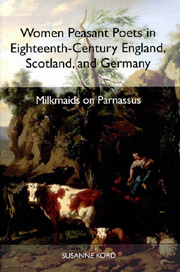Book contents
- Frontmatter
- Contents
- List of Illustrations
- Acknowledgments
- Introduction: Aesthetic Evasions and Social Consequences
- 1 Back to Nature: Bourgeois Aesthetic Theory and Lower-Class Poetic Practice
- 2 The Wild and the Civilized: Poet Making
- 3 The Life As the Work: Counterfeit Confessions, Bogus Biographies, Literary Lives
- 4 A Literature of Labor: Poetic Images of Country Life
- 5 Inspired by Nature, Inspired by Love: Two Poets on Poetic Inspiration
- 6 Of Patrons and Critics: Reading the Bourgeois Reader
- Conclusion: On the Gender and Class of Art
- Appendix: Short Biographies of Women Peasant Poets
- Works Cited
- Index
3 - The Life As the Work: Counterfeit Confessions, Bogus Biographies, Literary Lives
Published online by Cambridge University Press: 05 February 2013
- Frontmatter
- Contents
- List of Illustrations
- Acknowledgments
- Introduction: Aesthetic Evasions and Social Consequences
- 1 Back to Nature: Bourgeois Aesthetic Theory and Lower-Class Poetic Practice
- 2 The Wild and the Civilized: Poet Making
- 3 The Life As the Work: Counterfeit Confessions, Bogus Biographies, Literary Lives
- 4 A Literature of Labor: Poetic Images of Country Life
- 5 Inspired by Nature, Inspired by Love: Two Poets on Poetic Inspiration
- 6 Of Patrons and Critics: Reading the Bourgeois Reader
- Conclusion: On the Gender and Class of Art
- Appendix: Short Biographies of Women Peasant Poets
- Works Cited
- Index
Summary
The continued existence of patronage throughout the eighteenth century and its near-exclusive application to lower-class poets resulted, as discussed in the previous chapter, in two far-reaching consequences. First, the phenomenon of patronage not only drastically influenced how lower-class literature was produced — through near-total control over publication in terms of access to the literary market and, consequently, significant control over writing in terms of form, content, and authorial perspective — but also how it was read. Second, the way literature was read differed significantly from new conceptualizations of the bourgeois literary enterprise: the phenomenon of patronage essentially results in a fundamental rift between the reception of bourgeois and that of lowerclass literature. In effect, postpatronage bourgeois literature, with its new aspirations to transcendence, was, ideally at least, judged on its “intrinsic merit,” whereas biographical background was deemed as indispensable for an assessment of lower-class literature as it was for the presentation of the lower-class “genius” in the foreword. Some poetological treatises already suggest a connection between biography and poetry as central to the products of natural genius — for example, Alexander Gerard's Essay on Genius postulated an inevitable literary (auto)biographism on the part of both author and reader. The (auto)biographical aspects of the literary text, in his theory, are automatically inferred by the reader: when reading a poem about war, soldiers revel in the glory of death, ladies sympathize with the wives of the fallen, and merchants note the ways in which trade is affected by war.
- Type
- Chapter
- Information
- Women Peasant Poets in Eighteenth-Century England, Scotland, and GermanyMilkmaids on Parnassus, pp. 105 - 159Publisher: Boydell & BrewerPrint publication year: 2003

